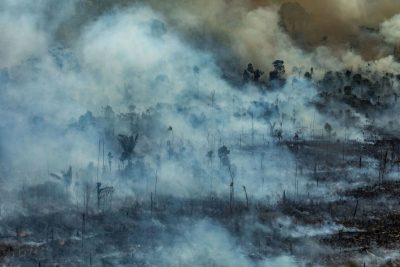Activists Follow the Money Fueling Amazon Fires

While the world watches in horror as fires rage on in the Amazon, activists are shining a light on the big businesses destroying what’s popularly known as the “lungs of the Earth.” On September 5, people around the globe stood in solidarity with the rainforest’s indigenous communities by partaking in the Global Day of Action for the Amazon, staging protests and singling out the bad actors profiting off deforestation.
In Washington, D.C. protesters chanted “Put out the flames, we name your names — politicians, corporate vultures, you’re the ones we blame,” as they marched from the White House to the Brazilian Consulate. Activists around the world have been protesting Brazilian President Jair Bolsonaro, who has steadily rolled back indigenous land rights and environmental protections from his very first hours in office. A coalition — which includes Amazon Watch and Friends of the Earth, among others — is also putting pressure on the multinational corporations turning a profit off the destruction of the Amazon.
Amazon Watch, a California-based organization that works in concert with indigenous and environmental groups, issued a report earlier this year documenting the dozens of companies that stand to make money as Bolsonaro strips regulations in Brazil. The report, titled Complicity in Destruction, highlights the main drivers of deforestation — from soy and beef commodity traders like Cargill and JBS, to their financiers in North America and Europe, like BlackRock, Santander, and JP Morgan Chase. And research from Mighty Earth has documented the retailers most associated with those traders, like Costco, Walmart, and Ahold Delhaize — which owns Stop & Shop, Giant, and Food Lion.
Protesters in D.C. took aim at the U.S.-based companies highlighted in the campaign to defund deforestation.
“There are many, many large corporations in the United States — including Cargill, ADM and BlackRock — who all have a hand in the destruction of the Amazon and we encourage all Americans to use their economic power to put pressure on these companies to do the right thing,” Todd Larsen, the Executive Co-Director for Consumer & Corporate Engagement at Green America told Inequality.org.
Green America is encouraging Americans to use their investments to put economic pressure on the companies profiting off deforestation.
“The only reason these companies are able to keep burning down the forest year over year is because their customers keep paying them to do so,” Bárbara Amaral of Brazilians for Democracy and Social Justice told the crowd in D.C. “It’s time for supermarket giants like Costco, Walmart, Ahold, to immediately suspend contacts with Cargill and JBS, and for the public to show up at the front doors of Cargill headquarters and yell that it’s time to protect the Amazon.”
Protecting the environment must include structural changes to the economy that keep companies from making a quick buck off climate disaster, protesters said.
“I came out today because I am in support of changing the climate debate into a debate that is critical about the current economic system that exists in the world that is perpetuating climate change,” Gabby Rosazza, a campaigner with the International Labor Rights Forum told Inequality.org. “In particular, I’m tired of hearing about how individual actions can address climate change such as buying metal straws versus plastic straws. I’m more interested in learning about who is profiting from climate change.”
One of the companies profiting the most? BlackRock — the largest asset manager in the world. A report released last month by Amazon Watch and Friends of the Earth found BlackRock to be among the top three shareholders in 25 of the largest publicly-traded deforestation-risk companies. And the asset manager’s deforestation presence grew by more than $500 million between 2014 and 2018. Activists in London, Stockholm, San Francisco, Boston and Hong Kong targeted BlackRock during Thursday’s Global Day of Action, holding protests and die-ins outside the asset manager’s offices.
The recent report and protests are the latest addition to a pressure campaign mounting on BlackRock for continuously profiting off climate destruction, from the Amazon to the Alberta tar sands to Arctic oil reserves. Indigenous and environmental activists held protests at BlackRock’s annual general meeting earlier this year. Luiz Eloy Terena, legal counsel for the National Indigenous Organization of Brazil (also known as APIB) and a member of Brazil’s indigenous Terena community, expressed her criticism to BlackRock CEO Larry Fink directly during the meeting and demanded an audit of BlackRock investees operating on Brazilian indigenous territories.
“Brazilian indigenous peoples and lands are under immense threat from the beef and soy industries working hand in glove with the Bolsonaro regime to undermine protections that keep our forests standing and our climate stable,” Terena said in a statement released after his conversation with Fink.
“When BlackRock funnels investments to these bad actors in Brazil, it is complicit in the destruction of tropical forests and violation of human rights. BlackRock must use its significant influence over these companies to signal that it will not tolerate policies that violate indigenous rights and damage the climate.”
*
Note to readers: please click the share buttons above or below. Forward this article to your email lists. Crosspost on your blog site, internet forums. etc.
Negin Owliaei co-edits Inequality.org.
Kelsey Hawkins-Johnson is a Landau Fellow at the Institute for Policy Studies.
Featured image is from Greenpeace

